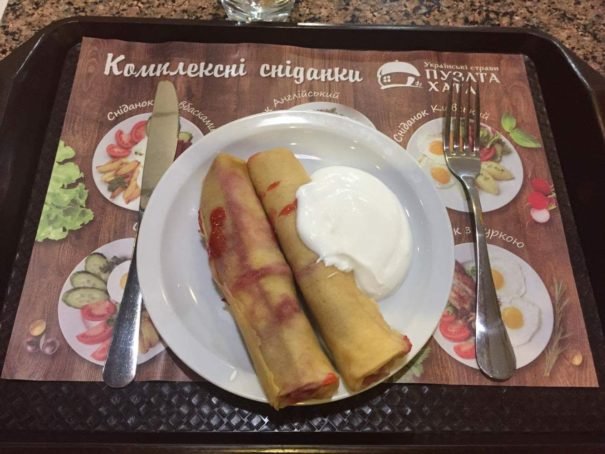
Here’s to Pancakes and New Beginnings

Here’s to Pancakes and New Beginnings
Blinis in Dnipro
Puzatta Hata is the largest Ukrainian cuisine chain restaurant. It’s welcoming, warm, and most of all, reliable. When I first arrived in Dnipro, Ukraine back in September of 2016, I was lost. I fell asleep immediately after moving into my new apartment, and thus in the morning, I became painfully aware of my empty fridge and even emptier stomach. Exhausted, dehydrated, and jetlagged, I left my apartment.
When I first entered Puzatta Hata, a wide variety of scents overwhelmed me. The buffet-style restaurant is something that has always hit or miss for me in the U.S., but as I soon learned, this Puzatta Hata would be a refuge. After long intercity travel, late night English lessons, or freezing evenings when the very idea of moving felt like too much work, Puzatta Hata was there for me.
That first morning I watched leisurely as a child was lifted to the sinks at the restaurant’s entrance. A frown soon formed on his mother’s face as her son splashed water instead of washing his hands. “блин” she muttered and my eyes shifted to the very thing she was alluding to. Pancakes.
Dnipro, the city I had moved to, is mostly Russian-speaking. And although Ukrainian has become more prevalent in day to day life, certain phrases remain habits. “блин” which directly translates to pancake, is a common way to say “whoops.”
“Пе́рвый блин всегда́ ко́мом” is a famous Russian saying which roughly translates to “The first pancake is always a blob.” This was true for my first month living in the industrial city of Dnipro, Ukraine, but like making pancakes, each month, my days improved.
Walking into Puzhatta Hata in the morning, I had my choice of eggs, sausage, borscht, cheeses, vegetables, and, of course, pancakes. Now, these pancakes aren’t like those one would expect in the United States. More reminiscent of a crepe, Russian pancakes—blinis—are thin. They are traditionally made from wheat, and sometimes buckwheat. Blini are served with anything from sour cream to quark butter, and can be wrapped around fruits, chocolate, or cheeses. If you really go all in, it feels like you’re eating dessert for breakfast. And on that first full day in Dnipro, desert for breakfast was exactly what I needed.
Historically, blini were thought to be a symbol of the sun due to their round form. Pre-Christian Slavs would prepare them at the end of winter in order to celebrate the rebirth of the new sun. Butter Week, or Maselnitsa (Russian: Мaсленица, Ukrainian: Масниця), the week before Lent begins when eggs, cheese, and other dairy can still be eaten, has even been adopted as a holiday by the Orthodox church, and blinis are the typical dish with which to celebrate.
As I sat there in the restaurant that morning, I couldn’t help but feel like something new was starting. It felt like a celebration, and my blini was the new sun, lighting the way to a year full of newness. Looking back, I didn’t know just how much a pancake can symbolize. How much a simple meal can warm you up and ensure that you are ready for the new day. How even if the first pancake isn’t great, the next will surely be better as you continue to strive and work.
Maybe it was just the hunger talking, but that first pancake, although doughy and far from a perfect circle, was one of the most perfect things I have ever eaten.